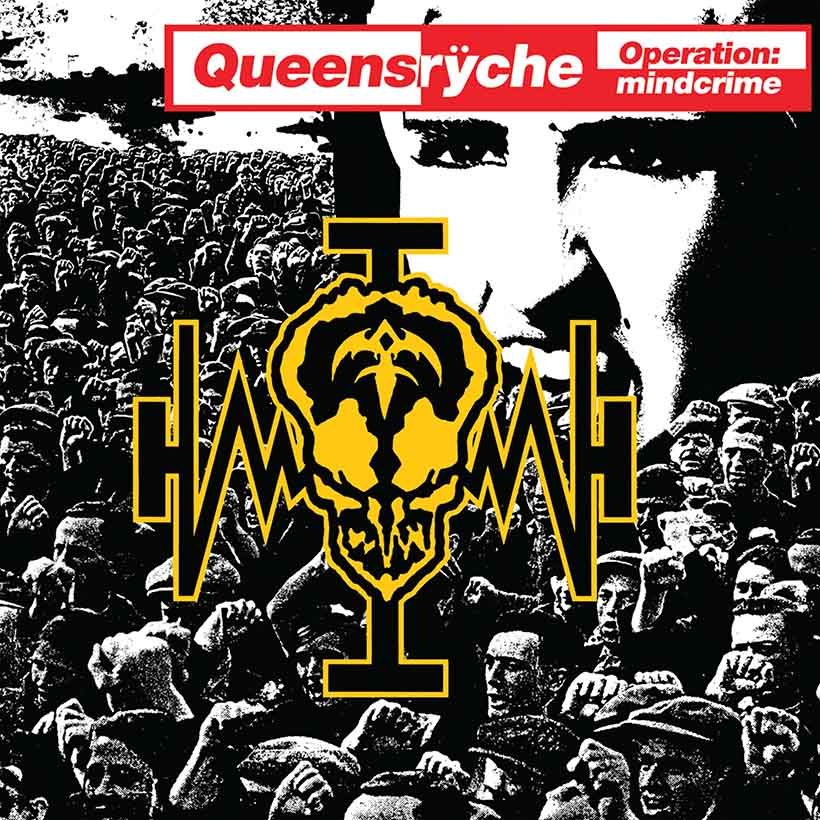‘Operation: Mindcrime’: Queensrÿche’s Lofty Concept Album
It was a concept album that shattered metal boundaries.

With their second full-length album, 1986’s Rage For Order, Washington State’s “thinking man’s metal” band, Queensrÿche began a conscious transformation. Though they retained their love for Judas Priest and Iron Maiden, they didn’t want to be lumped in with traditional metal so they started experimenting more with prog-rock structures and electronic embellishments. While Rage for Order was a solid effort, in retrospect, the album is best viewed as a bridge to the groundbreaking 1988 release Operation: Mindcrime, a lofty concept album that shattered metal boundaries and landed Queensrÿche in a realm previously dominated by Pink Floyd and Rush.
Having honed their playing and writing chops over the greater part of a decade, Queensrÿche were in fighting shape when they started working on the album. Geoff Tate’s vocals were clear and booming and while his high tenor vibrato still brought to mind Iron Maiden’s Bruce Dickinson, it was imbued with a sensitivity and vulnerability that stemmed more from the singer’s love for David Bowie and Depeche Mode. Guitarists Chris DeGarmo and Michael Wilton, meanwhile, were more entrenched in eclectic but razor-edged 70s and 80s metal, and handled delicate arpeggios and asymmetrical riffs with equal enthusiasm, trading off searing leads and providing the songs with point-counterpoint dynamics.
Listen to Operation:Mindcrime now.
Thematically, Operation: Mindcrime addresses governmental corruption, media manipulation, addiction, exploitation, revolution, and murder. Tate assembled the treatment after hearing outrageous stories from militant Quebec separatists. Combined with subplots about heroin abuse and doomed romance, what could have been a complete mess congealed into the most enthralling concept metal album of the 80s.
The record opens with the sound of hospital loudspeaker announcements. Then, the main character, a young, impressionable junkie named Nikki, wakes up in a mental hospital, vaguely aware he had been a hired hitman in a conspiracy to overthrow the government. “I remember now,” he says and flashes back to people and events that led him to his current predicament. There’s Mary, a teenage prostitute coerced into working with a corrupt priest and posing as a nun. Mary seduces Nikki, feeds his addiction, and, at the behest of their boss, Dr. X, encourages Nikki to assassinate politicians and religious leaders.
As the plot hits full boil, Dr. X orders Nikki to kill Mary and he refuses, sealing his fate. In true Italian opera-style, Nikki finds Mary’s lifeless body hanging by her rosary. Devastated, he suffers a mental breakdown and is then arrested for killing Mary and others. As the story comes full circle, Queensrÿche don’t spell out who killed Mary or what the future holds for Nikki and Dr. X, leaving room for the inevitable sequel, Operation: Mindcrime II, which came 18 years later.
To deliver poignant, powerful songs that matched the complex, cinematic storyline of Operation: Mindcrime, Queensrÿche fine-tuned their prog/power metal approach, intently focusing on the lyrical content of each song. Action scenes were supported by aggressive riffs, trenchant rhythms, and blazing solos (“Revolution Calling,” “Spreading the Disease,” “The Needle Lies”). When characters faced internal conflict and challenging decisions, Queensrÿche progged out with moody arpeggios, multiple rhythm shifts, and abrupt tempo changes (“The Mission,” and, most notably, the nearly eleven-minute-long “Suite Sister Mary”). And during moments of revelation and heartbreak, the band abandoned mathematical equations in favor of simpler, heartfelt songcraft (“Eyes of a Stranger,” the Grammy-nominated “I Don’t Believe in Love”).
To make Operation: Mindcrime even more immersive, Queensrÿche hired film composer Michael Kamen and producer Peter Collins (who, not so coincidentally, worked on two albums for heady power-trio Rush). Finally, the band solidified the story by adding between-track sound effects and hiring five actors to read scripted dialogue. The results are grandiose without being overindulgent.
Operation: Mindcrime was immediately championed by the rock press and ranked high on all-time metal lists, yet it wasn’t an instant success. Many headbangers were initially thrown by all the cerebral stuff, and while the album peaked at number 50 on the Billboard 200, it didn’t go gold until after the melodic single “Eyes of a Stranger” received strong airplay; in 1991, Mindcrime became the band’s first platinum album. It was a sign of things to come.
Having recorded an explosive rock opera – the 80 metal equivalent of Rush’s 2112 – Queensrÿche had the momentum to follow up Operation: Mindcrime with another majestic, meticulous concept album. Instead, they built from the success of “Eyes of a Stranger” and “I Don’t Believe in Love” to create 1990’s Empire, their most commercially successful release to date. Maybe it was the smart career choice, but Operation: Mindcrime remains Queensrÿche’s most cinematic, progressive, and enduring release in their catalog. And while the storyline may have once seemed apocryphal, in an era of media manipulation, political insurrection, conspiracy theories and governmental turmoil, Tate’s dystopian vision is more relevant than ever.













Ronald
May 4, 2024 at 3:15 pm
There must be something in the air. I unboxed and dusted off my Queensrÿche albums this morning (May 4) to listen to after a long silence. I checked the web to see what people had to say about them and found your article dated… yesterday. Good stuff!